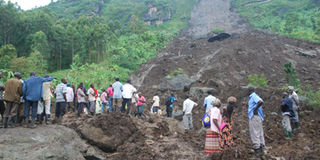Heavy rains displace 120,000 people- report

Locals standing at a landslide scene where 6 people were buried in Sironko recently. Photo by Yahudu Kitunzi
KAMPALA- About 12,000 people in over 20 districts have been displaced by landslides, storms and floods following the second season rainfall in Uganda, according to the September Early Warning Bulletin released by the Office of the Prime Minister (OPM).
The September Early Warning Bulletin indicates that about six people have so far died as a result of landslides and floods while ten people are still missing.
The report shows that about 40,000 people have been displaced in Kisoro, Bududa, Sironko, Bulambuli, Bundibugyo, Rukungiri and Elegu in Amuru Districts.
In Teso region, according to the bulletin, an estimated 50,000 to 80,000 people have been displaced due to floods.
The bulletin indicates that second season rainfalls are expected above normal and heavy and will continue up to December.
“It is causing massive floods and landslides in the mountainous areas. Those with homes on steep slopes, please shift to safe homes of relatives, friends, schools, churches and mosques. The dangerous rains take 30 to 60 days only. So, by 30th October it will begin reducing,” Mr Martin Owor, a commissioner in the OPM said.
He said that as the forecast shows, there is moderate chance of occurrence of landslides in Mt. Elgon and Mt. Rwenzori regions and moderate chance of occurrence of floods in Adjumani, Amuru, Nebbi, Zombo, Lamwo, Bulambuli districts.
Mr Owor listed Rakai, Kalungu, Masaka, Mpigi, Wakiso, Mukono, Buikwe, Jinja, Mayuge, Bugiri, Busia, Kalangala, Namiyango and Buvuma districts as having high chance of occurrence of hailstorms and lightning.
Mr Owor said rain-related diseases have manifested with 132,689 cases of malaria reported mostly in northern Uganda, West Nile and Kampala.
The bulletin also reports cases of bacterial meningitis in Arua, Lira, Oyam and Yumbe districts.
Mr Owor said government and donors are ready to deliver relief food and non-food commodities to affected people.




